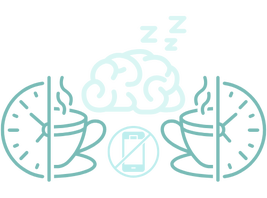
Habits and routines are the hidden framework that supports our daily lives. They guide us gently yet powerfully, shaping our outcomes and influencing our emotional well-being. Developing healthy, consistent habits and routines can be transformative, creating a path toward self-mastery, clarity, and purposeful living.
Consistent Wake-Up Time
Consistency starts first thing in the morning. Waking up at the same time each day, even on weekends, helps regulate your body's internal clock. This regularity enhances your sleep quality, boosts energy levels, and improves overall mood. By consistently rising at the same hour, your body learns when to produce essential hormones like cortisol for alertness and melatonin for restful sleep, fostering balance and stability.
Aim to gradually adjust your wake-up time if this is a new practice for you. Shift your alarm by just 10 minutes each week until you reach your ideal wake-up time. Keep your bedroom environment conducive to good sleep by minimizing distractions and establishing a relaxing pre-bedtime routine. These small adjustments can significantly ease the transition to a consistent schedule.
Morning Ritual
A well-crafted morning ritual sets the tone for a productive and peaceful day. Start your day intentionally with practices such as prayer, affirmations, or journaling. Prayer helps center your spirit, affirmations reinforce positive beliefs and intentions, and journaling allows for clear-minded reflection and goal setting. Even dedicating just 10 to 15 minutes to these practices can significantly impact your outlook, preparing you to face the day's challenges with clarity and confidence.
Consider incorporating physical movement into your morning ritual as well, such as gentle stretching, yoga, or a brief walk. Physical activity in the morning not only invigorates your body but also sharpens your mind, setting a strong and energetic foundation for the day ahead.

Evening Reflection
Just as important as starting your day intentionally is concluding it with purposeful reflection. Allocate 5 to 10 minutes each evening to assess your day. Reflect on what went well, celebrate your successes, and honestly evaluate areas for improvement. This practice encourages continual personal growth and emotional resilience, allowing you to learn from your experiences and move forward with wisdom.
Enhance this reflective period by writing down your thoughts. Journaling your reflections helps clarify your insights and gives you tangible evidence of your growth over time. This nightly practice can also significantly reduce stress and anxiety by providing a structured opportunity to process your emotions and thoughts.
Building New Habits
Forming new habits involves patience and persistence. Use techniques such as habit stacking, where you attach your new desired habit to an existing routine. For example, if you already brew coffee every morning, stack your journaling or affirmation practice immediately afterward. This strategy leverages established behaviors to reinforce new habits effectively.
It's also essential to maintain a positive mindset about habit formation. Focus on the progress you make each day rather than perfection. Celebrate small wins to keep motivation high, and adjust your approach as needed to stay aligned with your goals and lifestyle.

Making it Stick
The key to making these habits stick lies in simplicity and consistency. Start small, and do not overwhelm yourself with drastic changes. Celebrate your consistency, and remember that routines should empower you, not constrain you. By consciously integrating these practices, consistent wake-up times, purposeful morning rituals, reflective evenings, and strategic habit-building techniques, you lay a solid foundation for a more intentional, balanced, and fulfilling life.


Add comment
Comments